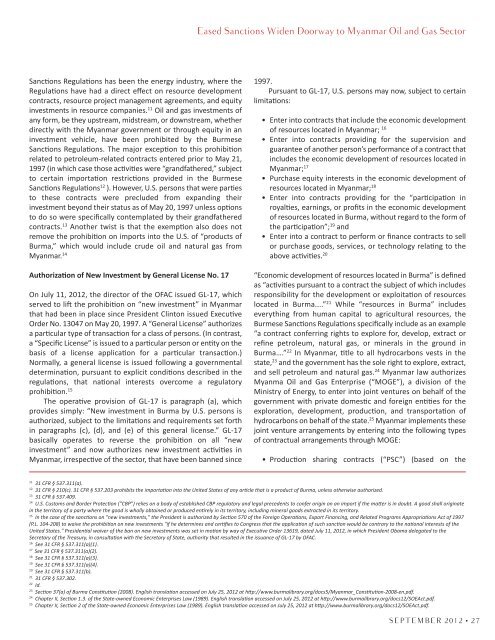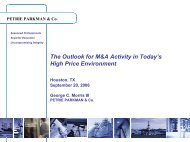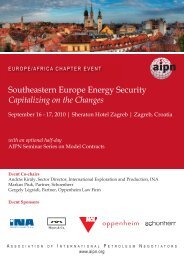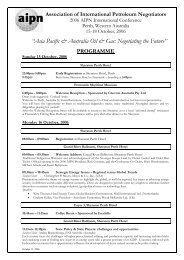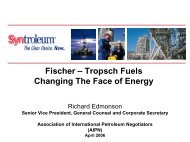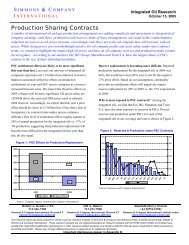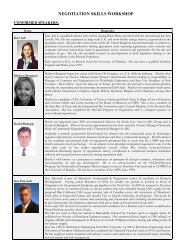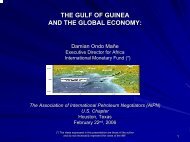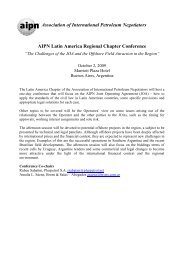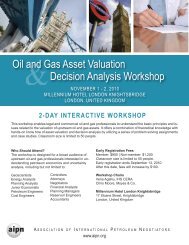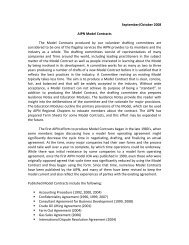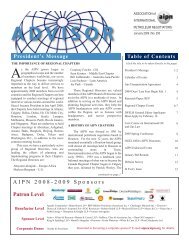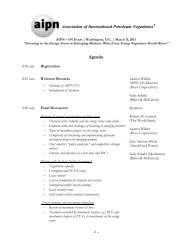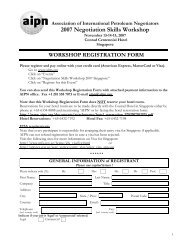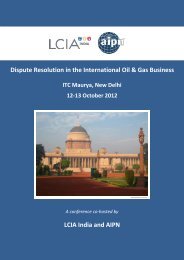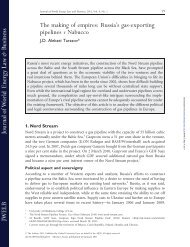ADVISOR - AIPN
ADVISOR - AIPN
ADVISOR - AIPN
Create successful ePaper yourself
Turn your PDF publications into a flip-book with our unique Google optimized e-Paper software.
Sanctions Regulations has been the energy industry, where the<br />
Regulations have had a direct effect on resource development<br />
contracts, resource project management agreements, and equity<br />
investments in resource companies. 11 Oil and gas investments of<br />
any form, be they upstream, midstream, or downstream, whether<br />
directly with the Myanmar government or through equity in an<br />
investment vehicle, have been prohibited by the Burmese<br />
Sanctions Regulations. The major exception to this prohibition<br />
related to petroleum-related contracts entered prior to May 21,<br />
1997 (in which case those activities were “grandfathered,” subject<br />
to certain importation restrictions provided in the Burmese<br />
Sanctions Regulations 12 ). However, U.S. persons that were parties<br />
to these contracts were precluded from expanding their<br />
investment beyond their status as of May 20, 1997 unless options<br />
to do so were specifically contemplated by their grandfathered<br />
contracts. 13 Another twist is that the exemption also does not<br />
remove the prohibition on imports into the U.S. of “products of<br />
Burma,” which would include crude oil and natural gas from<br />
Myanmar. 14<br />
Authorization of New Investment by General License No. 17<br />
On July 11, 2012, the director of the OFAC issued GL-17, which<br />
served to lift the prohibition on “new investment” in Myanmar<br />
that had been in place since President Clinton issued Executive<br />
Order No. 13047 on May 20, 1997. A “General License” authorizes<br />
a particular type of transaction for a class of persons. (In contrast,<br />
a “Specific License” is issued to a particular person or entity on the<br />
basis of a license application for a particular transaction.)<br />
Normally, a general license is issued following a governmental<br />
determination, pursuant to explicit conditions described in the<br />
regulations, that national interests overcome a regulatory<br />
prohibition. 15<br />
The operative provision of GL-17 is paragraph (a), which<br />
provides simply: “New investment in Burma by U.S. persons is<br />
authorized, subject to the limitations and requirements set forth<br />
in paragraphs (c), (d), and (e) of this general license.” GL-17<br />
basically operates to reverse the prohibition on all “new<br />
investment” and now authorizes new investment activities in<br />
Myanmar, irrespective of the sector, that have been banned since<br />
Eased Sanctions Widen Doorway to Myanmar Oil and Gas Sector<br />
1997.<br />
Pursuant to GL-17, U.S. persons may now, subject to certain<br />
limitations:<br />
• Enter into contracts that include the economic development<br />
of resources located in Myanmar; 16<br />
• Enter into contracts providing for the supervision and<br />
guarantee of another person’s performance of a contract that<br />
includes the economic development of resources located in<br />
Myanmar; 17<br />
• Purchase equity interests in the economic development of<br />
resources located in Myanmar; 18<br />
• Enter into contracts providing for the “participation in<br />
royalties, earnings, or profits in the economic development<br />
of resources located in Burma, without regard to the form of<br />
the participation”; 19 and<br />
• Enter into a contract to perform or finance contracts to sell<br />
or purchase goods, services, or technology relating to the<br />
above activities. 20<br />
“Economic development of resources located in Burma” is defined<br />
as “activities pursuant to a contract the subject of which includes<br />
responsibility for the development or exploitation of resources<br />
located in Burma....” 21 While “resources in Burma” includes<br />
everything from human capital to agricultural resources, the<br />
Burmese Sanctions Regulations specifically include as an example<br />
“a contract conferring rights to explore for, develop, extract or<br />
refine petroleum, natural gas, or minerals in the ground in<br />
Burma….” 22 In Myanmar, title to all hydrocarbons vests in the<br />
state, 23 and the government has the sole right to explore, extract,<br />
and sell petroleum and natural gas. 24 Myanmar law authorizes<br />
Myanma Oil and Gas Enterprise (“MOGE”), a division of the<br />
Ministry of Energy, to enter into joint ventures on behalf of the<br />
government with private domestic and foreign entities for the<br />
exploration, development, production, and transportation of<br />
hydrocarbons on behalf of the state. 25 Myanmar implements these<br />
joint venture arrangements by entering into the following types<br />
of contractual arrangements through MOGE:<br />
• Production sharing contracts (“PSC”) (based on the<br />
11 31 CFR § 537.311(a).<br />
12 31 CFR § 210(c). 31 CFR § 537.203 prohibits the importation into the United States of any article that is a product of Burma, unless otherwise authorized.<br />
13 31 CFR § 537.409.<br />
14 U.S. Customs and Border Protection ("CBP") relies on a body of established CBP regulatory and legal precedents to confer origin on an import if the matter is in doubt. A good shall originate<br />
in the territory of a party where the good is wholly obtained or produced entirely in its territory, including mineral goods extracted in its territory.<br />
15 In the case of the sanctions on "new investments," the President is authorized by Section 570 of the Foreign Operations, Export Financing, and Related Programs Appropriations Act of 1997<br />
(P.L. 104-208) to waive the prohibition on new investments "if he determines and certifies to Congress that the application of such sanction would be contrary to the national interests of the<br />
United States." Presidential waiver of the ban on new investments was set in motion by way of Executive Order 13619, dated July 11, 2012, in which President Obama delegated to the<br />
Secretary of the Treasury, in consultation with the Secretary of State, authority that resulted in the issuance of GL-17 by OFAC.<br />
16 See 31 CFR § 537.311(a)(1).<br />
17 See 31 CFR § 537.311(a)(2).<br />
18 See 31 CFR § 537.311(a)(3).<br />
19 See 31 CFR § 537.311(a)(4).<br />
20 See 31 CFR § 537.311(b).<br />
21 31 CFR § 537.302.<br />
22 Id.<br />
23 Section 37(a) of Burma Constitution (2008). English translation accessed on July 25, 2012 at http://www.burmalibrary.org/docs5/Myanmar_Constitution-2008-en.pdf.<br />
24 Chapter II, Section 1.3. of the State-owned Economic Enterprises Law (1989). English translation accessed on July 25, 2012 at http://www.burmalibrary.org/docs12/SOEAct.pdf.<br />
25 Chapter II, Section 2 of the State-owned Economic Enterprises Law (1989). English translation accessed on July 25, 2012 at http://www.burmalibrary.org/docs12/SOEAct.pdf.<br />
SEPTEMBER 2012 • 27


